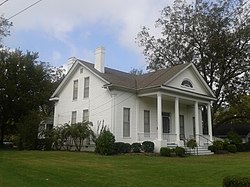United States historic place
| Bolling–Gatewood House | |
| U.S. Historic district Contributing property | |
 The Bolling–Gatewood House in October 2017 The Bolling–Gatewood House in October 2017 | |
  | |
| Interactive map showing the location for Bolling-Gatewood House | |
| Location | 220 Randolph Street North, Holly Springs, Marshall County, Mississippi, U.S. |
|---|---|
| Coordinates | 34°46′19″N 89°26′42″W / 34.7720°N 89.4451°W / 34.7720; -89.4451 |
| Built | 1858 |
| Architect | Spires Boling |
| Architectural style | Greek Revival |
| Part of | East Holly Springs Historic District (ID83000960 ) |
| MPS | Holly Springs MRA |
| Added to NRHP | April 20, 1983 |
The Bolling–Gatewood House is a historic cottage in Holly Springs, Mississippi, USA. It is home to the Ida B. Wells-Barnett Museum, named for former slave, journalist, and suffragist Ida B. Wells.
Location
The house is located at 220 Randolph Street North in Holly Springs, a small town in northern Mississippi. It is off U.S. Route 78.
History
The house was completed in 1858. It was designed as a two-storey wood cottage in the Greek Revival architectural style. The portico has five bays and octagonal columns. The cottage is white. It was built by Spires Boling (sometimes misspelled as Bolling), a master builder and later architect who designed it. Boling is also credited with White Pillars and Finley Place. Boling owned nine slaves, including Lizzie Wells and Ida B. Wells, who went on to become a renowned Civil Rights activist.
Later, the house became known as the Ida B. Wells-Barnett Museum. The museum presents "the contributions of African Americans in the fields of history, art and culture." In July 2013, three memorial trees were planted in the garden in honor of Wells's prominent grandchildren: Benjamin C. Duster III (1927–2011), an attorney; Charles E. Duster, Sr. (1929–1991), an architect; and Donald L. Duster (1932–2013), a business executive.
Architectural significance
As a contributing property to the East Holly Springs Historic District, it has been listed on the National Register of Historic Places since April 20, 1983. Additionally, it has been a Mississippi Landmark since 2000.
References
- "National Register Information System". National Register of Historic Places. National Park Service. July 9, 2010.
- ^ "Spires Boling House Bolling–Gatewood House [Ida B. Wells Museum]". Mississippi Department of Archives and History. Retrieved September 7, 2015.
- ^ "Historic House Museums". Mississippi Hills National Heritage Area. Retrieved September 7, 2015.
- ^ "Wells-Barnett Museum [Ida B. Wells Museum]". The Ida B. Wells Memorial Foundation. Archived from the original on August 16, 2015. Retrieved September 7, 2015.
- ^ "National Register of Historic Places Inventory–Nomination Form: East Holly Springs Historic District". National Park Service. Retrieved September 7, 2015.
- ^ Dorrien, Gary (2015). The New Abolition: W. E. B. Du Bois and the Black Social Gospel. New Haven, Connecticut: Yale University Press. p. 85. ISBN 9780300205602.
- Black, Patti Carr (December 11, 1998). Art in Mississippi, 1720-1980. Univ. Press of Mississippi. ISBN 9781578060849. Retrieved December 11, 2018 – via Google Books.
- Houses completed in 1858
- Buildings and structures in Holly Springs, Mississippi
- Houses on the National Register of Historic Places in Mississippi
- Greek Revival houses in Mississippi
- Antebellum architecture
- National Register of Historic Places in Marshall County, Mississippi
- Historic district contributing properties in Mississippi
- Ida B. Wells